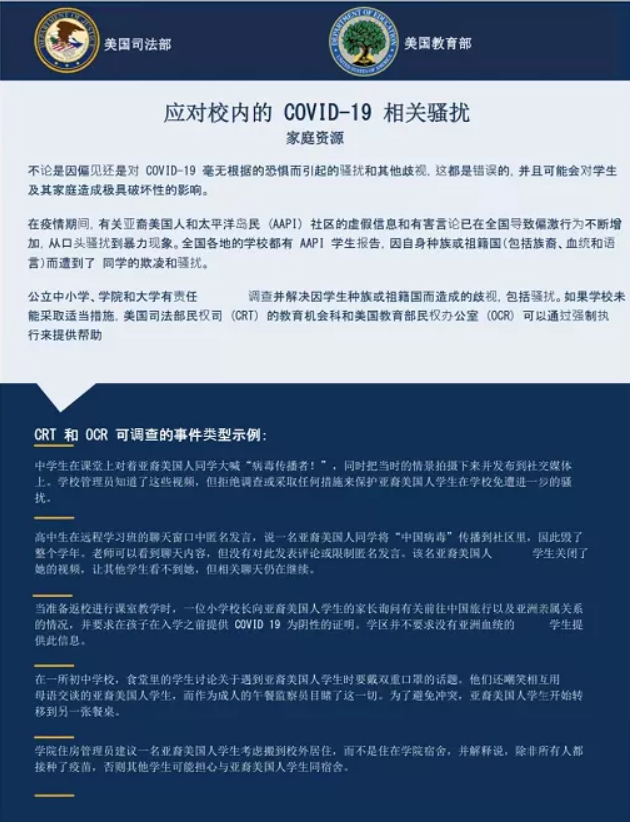Parents, do you understand how we can help our children cope with discrimination, bullying, aggression, bullying at school during the pandemic?
1. Microaggressions
Advice for kids:
- Ask the offender — “Why do you think this is [funny/true/flattering]?”
- Use “I” to express your feelings — “This leaves me [disappointed/hurt/excited].”
- Practice how you respond when someone is slightly offensive to you.
Advice for parents:
- Create an open space where your child can share their experiences of being offended without judging right or wrong, and listen, understand and accept your child’s feelings.
- Learn more about it, offer advice, and look for multiple solutions together
2. Discrimination and Bullying
Are you worried about your child being discriminated against/bullied?
During the pandemic, Dr. Weiyang Xie of the University of Notre Dame, who conducts psychological research and clinical psychological counseling for college students, and her colleagues conducted a survey of Chinese parents, in which 258 parents answered the following questions:
“How worried are you about your child (or yourself) being bullied or discriminated against during COVID-19?”
Only 4% said they were not worried about their children being discriminated against during the pandemic. Twenty-two percent said they were somewhat concerned, 48 percent somewhat concerned and 26 percent very concerned.
How does the school combat bullying?
Each school district in the U.S. K-12 system sets its own anti-bullying policy. The school has a clear anti-bullying policy in its student code and school rules.”
Similarly, in universities, there are rules, reporting procedures, and intervention mechanisms.
Parents are advised to take a moment to review the school district’s policies and rules on hate and racism with their children.
What kind of behavior is bullying?
- Physical aggression (hitting, pushing, pinching, kicking)
- Teasing and abuse
- Spread rumors or tell people not to be friends with someone
- Cyberbullying (Bullying doesn’t just happen at school these days. It can happen at home, too.)
How do children deal with discrimination and bullying?
- Ask in a gentle way. For example: “I don’t know what you mean, could you please clarify…”
- Provide explanations or education. For example: “We should not associate the name of the virus with a specific group of people because it will harm the whole group.”
- It’s more acceptable to tell someone how you feel in the first person rather than the second person. For example: “I’m sad” (instead of, “You’re making me sad”).
- If the other person doesn’t accept it at the moment, avoid arguing, and choose another time or occasion to restate your position.
What should parents do when their children are being bullied?
- First, parents should “listen, ask and observe more” to determine whether their children are being bullied.
- Discuss bullying with your child before school starts.
- Give children support, don’t blame and criticize.
- Be sure to tell the child that safety is the first thing, if you feel dangerous, to go away immediately.
- Tell your child who they can turn to as a trusted adult when they are bullied.
- Don’t let your child fight back or stay silent when bullied.
- Let children learn to make friends.
- Teach your children how to protect themselves.
- Work with school teachers to intervene.
- Calling the bully’s parents may not work.
If a child is being bullied or discriminated at school, should he/she tell the teacher, principal, police or parents first?
This can be done in the following order:
- Teacher
- Instructor (Counselor)
- Assistant Principal
- Principal
- Parents can also report the case to CRT and OCR on their own (see the following figure for details). Once the case is registered, the school must respond.

《反亚裔歧视、反校园霸凌,父母须知手册》【上篇】(推荐收藏)
疫情期间,孩子们在学校可能会遭遇歧视/霸凌/冒犯/欺负,家长们,你们是否了解,当遇到这些情况时,我们要如何帮助孩子积极面对呢?
1: 如何应对微歧视(冒犯)
给孩子的建议:
- 向冒犯者提问——“为什么你认为这[有趣/真实/恭维]?”
- 用“我”来表达你的感受——“这让我感到[失望/受伤/激动]。”
- 练习一下当别人对你有轻微冒犯时,你该如何回应。
给父母的建议
- 创造一个开放的空间,让你的孩子能够分享他们被冒犯的经历,不评判是非,倾听、了解、接纳孩子的感受。
- 学习了解更多相关的知识,给孩子提供建议,并一起寻找多种解决方案
2: 如何应对歧视和霸凌
你担心孩子被歧视/霸凌吗?
在疫情期间,圣母大学从事心理研究和大学生临床心理咨询的谢维扬博士和她的同事针对华裔父母进行了一项调查,258位家长回答了以下问题:
“在COVID-19期间,你有多担心你的孩子(或你自己)受到欺凌或歧视?”
只有4%的人表示,他们不担心自己的孩子在疫情期间受到歧视。22%的人说他们有点担心,48%说比较担心,26%说非常担心。
学校是如何反霸凌的?
美国K-12教育系统的每个学区都会设定该区的反霸凌政策。学校在学生守则和校规里都会明确反霸凌的政策。”
同样的,在大学里,也有相应的校规、上报流程、干预处理机制。
建议父母花一点时间和孩子们一起看看本校区对于仇恨、种族歧视的政策和规则。
孩子如何应对歧视和霸凌?
- 采取平和的询问方式 。例如:“我不明白你的意思,可否请你明确一下……”
- 提供解释或教育。例如:告诉对方:我们不应该把病毒的名字和特定人群联系在一起,因为这样会对整个族群造成伤害。
- 用“第一人称”而非“第二人称”告诉对方你的感受,更容易为对方所接受。例如说:我很难过,而不是说:你让我很难过……
- 如果对方当下不接受,避免争论,选择另外一个时间/场合重新表达您的立场。
什么样的行为属于霸凌行为?
- 身体攻击(打、推、掐、踢)
- 戏弄和辱骂
- 散布谣言或告诉别人不要和某人做朋友
- 网络欺凌(“现在欺凌不仅仅发生在学校。它也发生在家里。”)
孩子受到霸凌,父母该怎么做?
- 首先,家长应该“多听,多问,多观察”,以确定孩子是否受到霸凌。
- 在开学前和孩子讨论什么是霸凌行为。
- 给孩子支持,不要责备和批评。
- 一定要告诉孩子,安全第一,如果感觉有危险,要立刻走开。
- 告诉孩子当遭遇霸凌时,可以向哪些可信任的成年人求助。
- 不要让孩子在遭遇霸凌时进行反击(打架)或选择沉默。
- 让孩子学会交朋友。
- 教你的孩子如何保护自己。
- 与学校的老师合作进行干预。
- 给实施霸凌者的父母打电话未必行的通。
如果孩子在学校受到霸凌和歧视,应该先告诉老师、校长、警察还是家长?
- 老师
- 教导员(Counselor)
- 助理校长
- 校长
- 家长还可以自行向CRT和OCR举报立案(具体做法参见下图),一旦立案学校必须做出反应。


